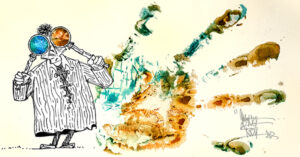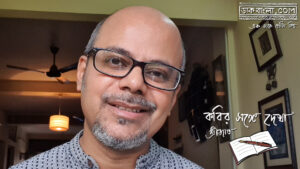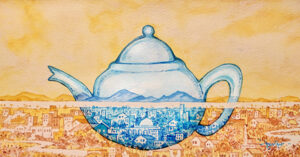Sounds Of Silence
We travel to places without paying great attention to their names like we come to feel love for strangers, indifferent to their names. In this is perhaps an intuitive acknowledgement of human language being an ornamental addition, unnecessary to existence and experience. It must have been this that made us complacent to find out the history behind its name when we travelled to Batabari a few days ago. Some members of the family kept pronouncing its name as if it was related to the Czech multinational footwear manufacturer while some presumed that it had to do with a species of fish common in Bengal. It turned out that the ‘bata’ in Batabari had to do with a species of bamboo and a manner of using it to make houses and meet other functional needs in the region. This learning was acquired just as we were entering Batabari. The place we had booked for a day had to be reached by crossing a bamboo bridge. My mother, with her severe arthritis, found it very difficult to walk on the bridge. Bamboo strips had been nailed together to create this structure, its uneven arcs demanded every step be balanced. It made demands on my mother’s legs and feet that she had lost a long time ago. In frustration and sadness, she asked an attendant, ‘Why such a bridge?’
‘This is the “bata” of Batabari,’ the young man explained.
Why had we come to Batabari, I wondered. Until a month ago, when enthusiasm for an outing began to collect in our conversations and we began scouting for nearby locations, all of this propelled by the far-from-the-madding-crowd urge to escape urban living, we had very rarely come across its name. Other places in the Dooars had been colonised for the tourist life: Lataguri in particular, its neighbour, seems to have transformed into a town only of ‘resorts’ – there might be more hotels and such resorts there than animals in forests nearby.
I say silence though that is not what I mean – I do not mean the absence of sound, but the absence of human speech. In the darkness, which is on the verge of extinction from our planet, we were able to experience what we had perhaps come to see – a world before this world, a world where frogs and crickets and the river, made anemic by winter and its lack of rains, scored a kind of composition that was unique to Batabari, and indeed perhaps to the Dooars.
Leaving Oodlabari and Malbazar behind us, we drove towards Batabari with the expectation that it would be significantly different from what was on either side of the highway. The entry to Batabari, though, was a disappointment: on the left were ‘resorts’ adjacent to each other, each with ‘cottages’ – any structure with a sloping tin roof – like flats in an apartment building. Opposite them were occasional tea gardens, the size of the bushes indicating the young life of these plantations. We were disappointed – the urge to escape into such spaces, mountains and forests, is perhaps the desire to experience places still untouched by humans. It is an illusion, for there is hardly any space that remains outside the greedy human’s control, but one wants to experience it even while knowing that one is paying for camouflage.
It wasn’t until we reached this nameless stream that we began to feel that we had actually left the city. Agricultural fields reminded us of the controlling presence of humans, of course, but very few of them were visible. I remember seeing only a child trying to climb a tree. Then we reached the ‘farm’ that we had booked to stay, a place by a stream on one side and a tea garden on another, goats and hens, cows and fishes all within the reach of our eyes. My nephew and niece, allowed to be without their masks, ran on the fields, we sat on the ground and watched them play, our pants soaking in dew, our hair the evening mist. None of this was new to us, though we wanted to pretend that it was.
Until there was a power cut … and everything changed. We were outdoors: my mother had been made to sit on a chair, the rest of us were by the stream or on the bridge, some on the machan. The disappearance of electric light seemed to have robbed us of sound as well. Except my three-year-old niece, who called out to her brother a couple of times – ‘Dada, don’t go anywhere, a tiger will eat you up’ – there was a kind of silence I hadn’t experienced in years. I say silence though that is not what I mean – I do not mean the absence of sound, but the absence of human speech. In the darkness, which is on the verge of extinction from our planet, we were able to experience what we had perhaps come to see – a world before this world, a world where frogs and crickets and the river, made anemic by winter and its lack of rains, scored a kind of composition that was unique to Batabari, and indeed perhaps to the Dooars.
We thought we had come to see. In that midnight dark we realised that we had perhaps actually come to hear Batabari.
Illustration by Chiranjit Samanta




